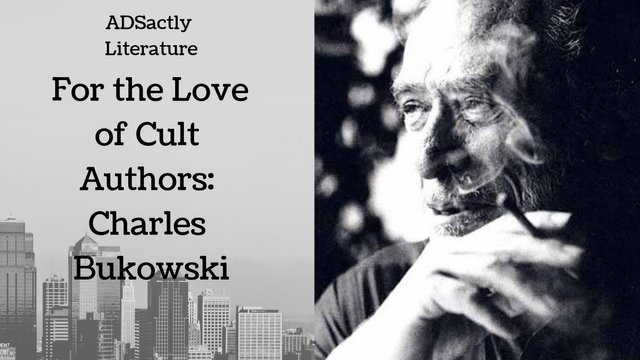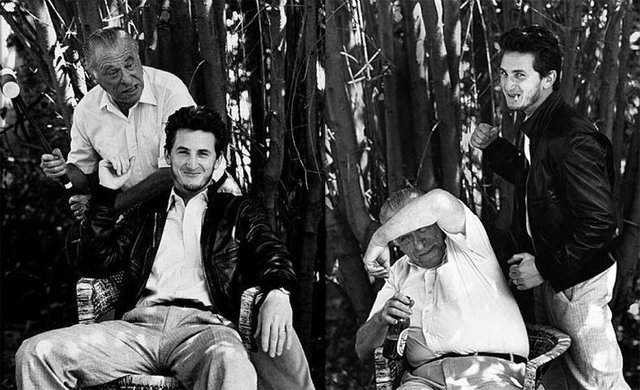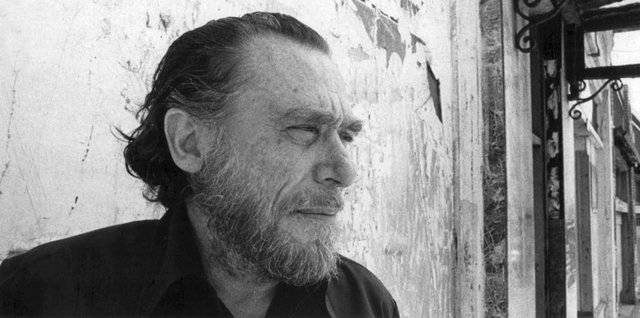
What exactly is a “cult author”? Not someone who writes about cults, certainly, but rather a writer who had (either during his lifetime or posthumously) gathered a cult following – squadrons of rabid fans re-reading his or her books over and over and quoting them to anyone who’s willing to listen.
It’s tricky to define exactly what makes a cult book, but chances are you’ll know when you read one. It’s often something obscure, because our society is obsessed with the strange and quirky. A cult author often comes at ya from the fringes of society, they write about the subcultures, about the downtrodden, about the underground. They represent that world you’d kinda like to inhabit, but are often too scared to do so. And often enough, they become the fascination of a lifetime.
In this new @adsactly series, we’ll be taking a look at several “cult authors” who mesmerize audiences well after their deaths. After looking at the lives of Beat icon Jack Kerouac and quirky recluse John Kennedy Toole, we now turn to the phenomenon that is Charles Bukowski’s writing.
If you’ve taken a walk inside a bookstore anytime in the past thirty years, chances are you’ve seen at least a couple of Bukowski books gloriously sitting on their shelves.
Charles ‘Hank’ Bukowski was the “laureate of American lowlife”, as Time magazine so aptly put it once. He was a voice for the masses of people living ordinary lives, he spoke for the downtrodden and the undergrounds. His writing was gritty, full of pain, love, alcohol and sex. And he was one of the best writers the 20th century had to offer.
Known by many as a staple writer of American culture (indeed, one of his greatest sources of inspiration was the city of Los Angeles, where he lived out most of his life), Buk was actually born in Prussia (present day Germany), in 1920. He was the son of a German-American soldier by the name of Heinrich (whose father had first immigrated to America in the 1880s) and a German woman called Katharina.
The family stayed in Germany for a few years after World War I, but eventually relocated to the United States, in 1923.
Charles Bukowski’s childhood was, by no means, an easy one. He was bullied by his peers for his thick German accent and later, for a serious acne problem. He was also abused, both mentally and physically by his father, Heinrich, who was a deeply unstable man, often beating his son for absolutely no reason.
Bukowski later claimed that the frequent beatings he suffered through childhood helped him with his writing. He explained that they had helped him understand undeserved suffering and they left him with a great deal of rage, inside him, which would later become a trademark of his writing.
As a young man, he tried to break into the literary world, submitting several short stories to magazines, and even though a few of them were accepted, he failed to get serious publishing recognition. When he was about 26 or so, he grew tired of trying and failing and quit writing for almost a decade. Just think, how horrible it would’ve been if he’d quit for good...how much great writing the world would have missed.

While I didn't find pictures of Bukowski as a young man, I did find these pics of him with a young Sean Penn...aren't they great?
src
During this ten year period, he worked various lowly jobs to support himself, such as letter carrier for the Los Angeles post office and worker in a pickle factory. After suffering a nearly-fatal ulcer in 1955, he took up writing again and had several of his poems published in small literary magazines. Throughout his life, Bukowski was a passionate supporter of small publishing houses and independent literary magazines.
In 1960, he took up a job as a letter filing clerk with the postal office, a position he held for over ten years and would’ve probably held until his death (or until he was fired), if it hadn’t been for a lucky break. Throughout his ten years at the post office, he continued to write, collaborating on various small literary endeavors and mainly writing at night, after finishing his soulless, draining job. And in 1969, Bukowski (almost fifty years old at the time) attracted the attention of Black Sparrow Press publisher John Martin, who offered him a $100/month pay if he would give up his job at the post office and take up writing full time, an offer Bukowski was all too happy to accept.
I have one of two choices – stay in the post office and go crazy ... or stay out here and play at writer and starve. I have decided to starve.
Appropriately, Bukowski’s first novel was entitled Post Office and it was released less than two years after he quit his job. It’s an autobiographical account of his time as a postal worker and a truly great read.
Bukowski stayed with Black Sparrow Press for the rest of his life, though he continued to submit short stories to literary magazines throughout. BSP slowly rose, along with Bukowski’s success, eventually becoming a huge name, particularly for “alternative” books. Not bad for a small publishing that was founded by Martin in order to publish Bukowski’s writing, huh? During his life, Charles Bukowski published six novels (all of which after leaving the post office at the age of fifty), over two dozen poetry books, several short story collections and some non-fiction (mostly letters). Bukowski died of leukemia, at the age of seventy-three, just after completing his last novel, Pulp. Then, there’s the late blooming aspect of his story. People love a good late-bloomer story and Bukowski’s really is impressive. To leave the slavery of a 9-to-5 job in order to pursue an artistic career and then become one of the most loved voices of the twentieth century at fifty years old – that’s something many wannabe writers and artists aspire to. It serves as great consolation for many and gives hope to those still trapped inside a 9-to-5 job. Slavery was never abolished, it was only extended to include all the colors. And this is why Charles Bukowski continues to fascinate people, more than twenty five years after his death, because he is someone we can dream of becoming. He’s someone who’s just low and dirty enough to be within reach. Naturally, Bukowski’s life and work has been the subject of many movies (such as Barfly), TV shows (such as the hugely popular Californication) and continues to inspire countless struggling writers today. References Wiki ; Brain Pickings
src
Legacy

src
Bukowski is well-known for his writing style , which is shoot-from-the-hip, gritty and straightforward, as well as for his lifestyle, which included copious amounts of drinking and countless love affairs. He embodies several dreams – first, there’s that crazy “artistic” life of sex, drugs and rock n roll (bonus the alcohol), that idea that to be a writer and a creator, one needs to indulge in excesses (not necessarily true, but a compelling fantasy for many).
Authored by @honeydue
Click on the coin to join our Discord Chat

Witness proposal is here:
Go To Steem Witness Page
In the bottom of the page type: adsactly-witness and press vote.

Use small letters and no "@" sign. Or, click here to vote directly!
Thank you!

The power of life experience will be a strong motivation in writing. As the experience of Charles Bukowski's life made his works more known. The reality of life that is not as easy as what people say makes the work so close to everyday life. With life experiences that are full of violence, alcohol and a variety of heart-wrenching inner experiences that make his work very touching the reader. We as readers will easily be swept away and always try to find pleasure when reading it.
And you describe this world-class writer very well
Thank you @honeydue
Thank you @adsactly
Thank you steemit
Warm regard from Indonesia
Downvoting a post can decrease pending rewards and make it less visible. Common reasons:
Submit
Well there you go - I hadnt heard of him until now ( and no I dont think I have been living under a rock)
A late bloomer he may have been but maybe he needed the experience of working in the postal service to inspire him to become the best he could be?
Love the pic of Sean Penn made me chuckle and agree with the quote about slavery involving all colours now - certainly feels like that most of the time!
Downvoting a post can decrease pending rewards and make it less visible. Common reasons:
Submit
I love the daring, irreverent and controversial Bukowski, although many believe he is a vulgar and vulgar writer only because his literature reflects the most decadent side of society, where vagabonds, the unemployed, prostitutes and the depressed take centre stage.his poem Throwing the Dice is almost an anthem for many:
Delighted to have done this reading. Thank you for bringing us this great writer, @honeydue.
Downvoting a post can decrease pending rewards and make it less visible. Common reasons:
Submit
Good thing you brought Bukovski, @honeydue! I think that Bukovski, like many other writers who are "on the razor's edge" (using the title of Somerset Maugham's novel), has been (and perhaps will be for a long time) valued from established conventional morality (that of "good consciences"), and hence prejudiced critical opinion. He was another "cursed poet" of American literature. He expressed a certainly bold and transgressive current, and as such attracted the interest of a group of writers and readers who identified with his irreverence and attitude "on the sidelines. I remember the film Barfly, with the serious performance of Mike Rourke; in its time (1988), it was quite an impact. Thanks for your post, @honeydue (always missing some illustrative text from the author). Greetings.
Downvoting a post can decrease pending rewards and make it less visible. Common reasons:
Submit
I admire his works, but I think that he start to be more recognised by a wide audience for movie adaptations of his books. But I not sure about that, its my personal though.
”Barfly” is one of my favorite movie.
Downvoting a post can decrease pending rewards and make it less visible. Common reasons:
Submit
Henry Chinasky My only prophet, I have been in the cemetery where he is buried to pay homage to him in August 2015
Posted using Partiko Android
Downvoting a post can decrease pending rewards and make it less visible. Common reasons:
Submit